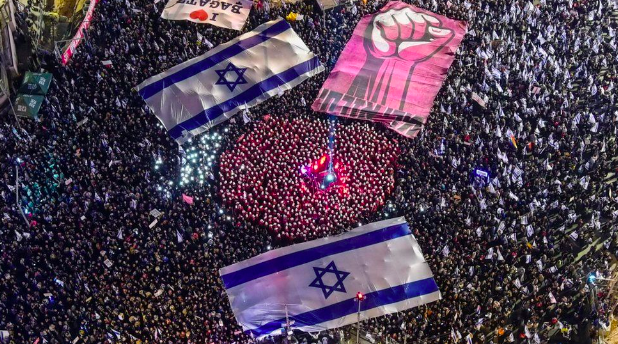Photo courtesy of BBC news
Tens of thousands of Israelis hit the streets on Sunday, March 26 to protest against the firing of Israel’s defense minister, and the new reforms that Prime Minister Benjamin Netanyahu is planning on enacting.
Netanyahu is planning on introducing new laws to overhaul the justice system, which would cause many disruptions. These new laws would make it harder for a court to remove leaders that aren’t fit for office. They would also threaten Israel’s checks and balances system and give the parliament the power to override court rulings. Many politicians in Israel and other countries spoke out against Netanyahu’s plan. One of these political figures was Yoav Gallant, Israel’s defense minister. Gallant expressed his disapproval of the new laws, and also stated that he was very worried for the safety of Israel. Netanyahu called Gallant into his office and fired him by saying, “that he doesn’t have any faith in him anymore and therefore he is fired.” After this was announced, Gallant took to twitter and wrote, “the security of the state of Israel always was and will remain my life mission.” Form VI student Maverick Cortes and one of the leaders of Fieldston’s Jewish Affinity Group agrees with Gallant and says, “I love Israel and want the best for her. I am hopeful that the government will recognize that these reforms in their current state are creating intense polarization (which we see in our own country) and for the spirit and safety of the Jewish state, consensus must be reached.”
On the night of Sunday March 26, Netanyahu announced his firing of Gallant. Protests against Netanyahu’s plans were already happening, but many more people joined in once they received the news that Gallant was fired. Protesters flooded the streets of Beersheba, Haifa, Tel Aviv and Jerusalem. Police fought protestors with water cannons and made arrests. In Tel Aviv, protesters blocked a major highway and lit bonfires while holding up Israeli flags. In Jerusalem, protestors gathered around Netanyahu’s private residence. One of these protestors named Inon Aizik said, “bad things are happening in this country.” When police showed up to stop the protests at Netanyahu’s estate, the protestors moved over to the Knesset (Israeli parliament building) to continue their chants. In addition to street protests, many members of the Israeli army are threatening to withdraw from their mandatory positions. There have been some deaths during the protests including an Italian tourist and two Israelis. A Palestinian man named Ahed Salim was shot in the stomach during the protests as well. Form III student Sarah Gallen agrees with many Israelis that the protests are justified and stated, “ In no other democracy does the legislative branch have the right to overrule the judicial branch.”
Due to the protests in Israel, and pressure from the United States, Netanyahu halted his plans to overhaul the Judiciary. Cortes (Form VI) says, “These protests are definitely putting pressure on Bibi (Netanyahu) and his coalition.” Israeli journalist Ilana Dayan states that Netanyahu is facing pressure from other governments and wants to keep Israel’s alliances intact. Dayan said, “So it’s not like Netanyahu did something he wanted to; he did something he had to” by postponing his plans to overhaul the judiciary. Gallen (Form III) believes that “Netanyahu will probably be forced to compromise his reforms” due to the pressure he is facing from other governments and Israeli citizens as well. As for the future, Dayan says that the war isn’t won yet, as the minister of justice has committed himself to passing the legislation and organizing groups of supporters to help him do so.






